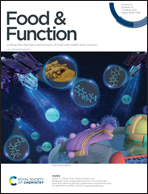Lactic acid bacteria strains relieve hyperuricaemia by suppressing xanthine oxidase activity via a short-chain fatty acid-dependent mechanism†
Abstract
Globally, the incidence of hyperuricaemia is steadily increasing. The evidence increasingly suggests an association between hyperuricaemia and the gut microbiota, which may enable the development of a novel therapeutic approach. We studied the effects of treatment with lactic acid bacteria (LAB) on hyperuricaemia and their potential underlying mechanisms. A mouse model of hyperuricaemia was generated by oral gavage with hypoxanthine and intraperitoneal injections of potassium oxonate for 2 weeks. The anti-hyperuricaemic activities of 10 LAB strains relative to allopurinol as a positive drug control were investigated in the mouse model. Lactobacillus rhamnosus R31, L. rhamnosus R28-1 and L. reuteri L20M3 effectively reduced the uric acid (UA) concentrations in serum and urine and the xanthine oxidase (XOD) activity levels in serum and hepatic tissue in mice with hyperuricaemia. These strains also reversed the elevated lipopolysaccharide (LPS) concentration, hepatic inflammation and slight renal injury associated with hyperuricaemia. A correlation analysis revealed that UA-reducing LAB strains promoted short-chain fatty acid (SCFA) production to suppress serum and hepatic XOD activity by increasing the abundances of SCFA production-related gut bacterial taxa. However, the UA-reducing effects of LAB strains might not be mediated by purine degradation. In summary, L. rhamnosus R31, L. rhamnosus R28-1 and L. reuteri L20M3 relieved hyperuricaemia in our mouse model by promoting SCFA production in a purine degradation-independent manner. Our findings suggest a novel therapeutic approach involving LAB strains for hyperuricaemia.



 Please wait while we load your content...
Please wait while we load your content...